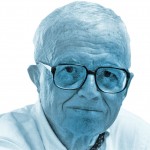
I could hardly believe my retinas the other day when I saw that the 2010 winner of the Man Booker Prize was a comic novel—a comic novel!—called The Finkler Question, by Howard Jacobson. The award is given annually for the best novel by an author living in Great Britain, Ireland, or one of the Commonwealth nations, and Booker winners tend not to be a lighthearted lot. Since the first award in 1969, they have included V. S. Naipaul, Iris Murdoch, Salman Rushdie, William Golding, J. M. Coetzee, Ruth Prawer Jhabvala, Ian McEwan, A. S. Byatt, Pat Barker, John Banville, and Anita Brookner, and their novels have left no acre of human misery untilled. How did Howard Jacobson and his comic novel sneak into that somber priesthood?
Bookerism is literature’s hot parlor game. The judges are at least as eminent as the authors—one panel had both a Dame (Rebecca West) and a Lady (Antonia Fraser)—and in the weeks preceding their decision the English air is thick with envious speculation. The first nugget fed to the press is the “long list” of finalists. That list generates a flurry of gossip over who will make the coveted “short list” of five authors, one of whom will subsequently be announced as the winner, thereby making the shortest list of all. It is from the Booker people that the English language has been given a new verb, to shortlist, and authors so anointed are identified for the rest of their lives as having been shortlisted for the Booker Prize.
At the recent ceremony in London, Harold Jacobson “accepted the award to unusually enthusiastic and sustained applause,” said The New York Times. The audience, I assume, was rejoicing in an event it thought it would never live to see: the liberation of the word comic from the label unserious.
“There is a fear of comedy in the novel today,” Mr. Jacobson wrote in The Guardian. “We have created a false division between laughter and thought, between the exhilaration that the great novels offer when they are at their funniest, and whatever else it is we now think we want from literature.” His award-winning book, The Finkler Question, was described by the Times as a novel about “friendship, wisdom and what it means to be Jewish.”
What it means to be Jewish is a recurring theme in postwar American literature, and it has found its most poignant expression in comic novels. Bruce Jay Friedman’s Stern and Philip Roth’s Portnoy’s Complaint are both deeply funny and deeply sad, and there’s no instrument sensitive enough to register where one element ends and the other begins.
Every great comic work is serious in its intention. Joseph Heller’s Catch-22 is the World War II book that most closely captures the farce of daily military life, just as Stanley Kubrick’s uproarious film Dr. Strangelove is the ultimate warning about nuclear rivalry. Kingsley Amis’s Lucky Jim, the champ comic novel of our times, is far more than the sum of its laughs; in its wake the pomposity of British academic striving lies demolished.
When newspapermen talk about the great books of their trade they soon gravitate to an 80-year-old comic novel, Evelyn Waugh’s Scoop. In 1930 Waugh went to Abyssinia to write a travel book about the grandiose coronation of the emperor Haile Selassie. There his reportorial efforts got bogged in a feudal 19th-century society, and his “travel” book, They Were Still Dancing, unwittingly foreshadowed what the newsreels would brutally tell us a few years later when the emperor’s foot soldiers tried to resist Mussolini’s invading tanks.
Waugh realized that the lens would need to be turned differently—mere reporting wouldn’t do the job—and in 1933 he recycled his findings into the comic novel Scoop, in which a London newspaper mistakenly sends its bumbling nature correspondent to cover a similarly outlandish war in a small African nation.
Rereading Scoop today, I have no trouble recognizing my own country’s latter-day military assaults on small Asian and Middle Eastern nations whose cultural heritage it doesn’t understand. Millions of honorable words have been written by brave journalists about the war in Iraq. But still untold is the larger American narrative of reckless lunacy and preening vainglory. When the great books about Iraq are written, I expect one of them to be a comic novel.

